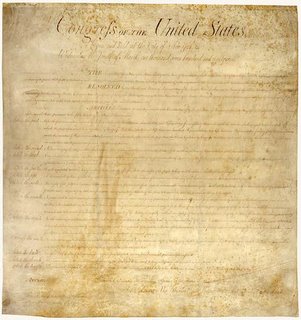
As everyone probably knows by now, Anna Diggs Taylor, a federal judge in Detroit has held that the NSA surveillance program is unconstitutional and therefore unenforceable. See ACLU v. NSA, U.S. District Court - Eastern District of Michigan).
The implementation of the decision has been stayed, to give the Department of Justice time to appeal the ruling. (I hope it’s an expedited appeal.)
The judge held that the program violates the First Amendment, as well as the Fourth Amendment (and is illegal for other reasons, as well, including the separation of powers doctrine). I don’t even want to try to summarize the entire decision here, as you can read it online if you are so inclined.
Instead, I want to comment briefly on her Fourth Amendment analysis . . . which was also brief. After tracing the history and purpose of the Fourth Amendment – which is to preserve privacy against government intrusions, especially in our homes and other important enclaves -- she concluded that the NSA wiretapping program has “obviously” been implemented “in violation of the Fourth Amendment.”
At the end of her opinion, she explains that none of the justifications the Administration has offered for the current surveillance program – e.g., that the threat of terrorism makes it impracticable to apply for and get wiretapping warrants – have any merit. As she said, the government’s argument as to “the need for speed and agility is . . . weightless.”
She also found that the program has been implemented in violation of the FISA (Foreign Intelligence Surveillance Act) statutes, which impose special requirements when federal agents are investigating terrorism and related activities (versus plain old “crime”). And she found that it violates Title III, a set of statutes which Congress adopted in 1968 to implement the Katz decision, the one I mentioned in an earlier post; Katz is important in this context because in Katz the Supreme Court held that wiretapping the content of phone conversations is a “search” under the Fourth Amendment, and so cannot constitutionally be done unless the government gets a search warrant beforehand.
I think Judge Taylor’s opinion is very well-reasoned and reaches the correct result. No one can argue against the need to prevent terrorism, but the government cannot use the threat of terrorism to bypass constitutional procedures that were created to guarantee us certain fundamental rights. If we allow that, we effectively surrender those rights.



No comments:
Post a Comment